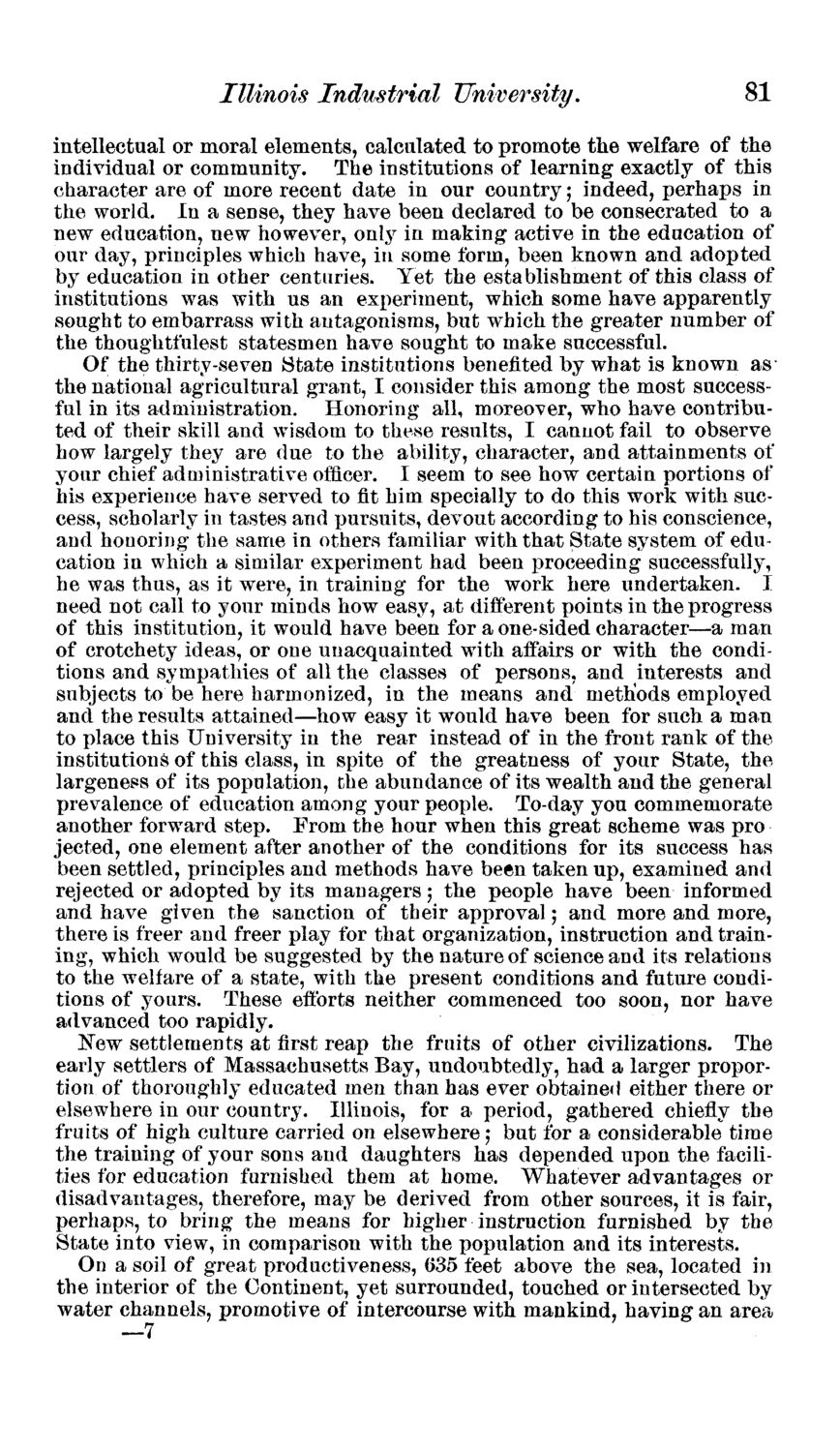| |
| |
Caption: Board of Trustees Minutes - 1874
This is a reduced-resolution page image for fast online browsing.

EXTRACTED TEXT FROM PAGE:
Illinois Industrial University. 81 intellectual or moral elements, calculated to promote the welfare of the individual or community. The institutions of learning exactly of this character are of more recent date in our country $ indeed, perhaps in the world. In a sense, they have been declared to be consecrated to a new education, new however, only in making active in the education of our day, principles which have, in some form, been known and adopted by education in other centuries. Yet the establishment of this class of institutions was with us an experiment, which some have apparently sought to embarrass with antagonisms, but which the greater number of the thoughtfulest statesmen have sought to make successful. Of the thirty-seven State institutions benefited by what is known as the national agricultural grant, I consider this among the most successful in its administration. Honoring all, moreover, who have contributed of their skill and wisdom to these results, I cannot fail to observe how largely they are due to the ability, character, and attainments of your chief administrative officer. I seem to see how certain portions of his experience have served to fit him specially to do this work with success, scholarly in tastes and pursuits, devout according to his conscience, and honoring the same in others familiar with that State system of education in which a similar experiment had been proceeding successfully, he was thus, as it were, in training for the work here undertaken. I need not call to your minds how easy, at different points in the progress of this institution, it would have been for a one-sided character—a man of crotchety ideas, or one uuacquainted with affairs or with the conditions and sympathies of all the classes of persons, and interests and subjects to be here harmonized, in the means and methods employed and the results attained—how easy it would have been for such a man to place this University in the rear instead of in the front rank of the institutions of this class, in spite of the greatness of your State, the largeness of its population, the abundance of its wealth and the general prevalence of education among your people. To-day you commemorate another forward step. From the hour when this great scheme was pro jected, one element after another of the conditions for its success has been settled, principles and methods have been taken up, examined and rejected or adopted by its managers 5 the people have been informed and have given the sanction of their approval 5 and more and more, there is freer and freer play for that organization, instruction and training, which would be suggested by the nature of science and its relations to the welfare of a state, with the present conditions and future conditions of yours. These efforts neither commenced too soon, nor have advanced too rapidly. New settlements at first reap the fruits of other civilizations. The early settlers of Massachusetts Bay, undoubtedly, had a larger proportion of thoroughly educated men than has ever obtained either there or elsewhere in our country. Illinois, for a period, gathered chiefly the fruits of high culture carried on elsewhere; but for a considerable time the training of your sons and daughters has depended upon the facilities for education furnished them at home. Whatever advantages or disadvantages, therefore, may be derived from other sources, it is fair, perhaps, to bring the means for higher instruction furnished by the State into view, in comparison with the population and its interests. On a soil of great productiveness, 635 feet above the sea, located in the interior of the Continent, yet surrounded, touched or intersected by water channels, promotive of intercourse with mankind, having an area
| |